Coronavirus in Scotland - Deaths fall for seventh weekpublished at 19:00 BST 17 June 2020
That concludes BBC Scotland's live online coverage of the Covid-19 crisis for Wednesday.
Live reporting will resume early on Thursday.
The weekly report on Covid-19 linked deaths show that there has been a total of 4,070 fatalities
The figure from National Records of Scotland is calculated up to Sunday, 14 June. Between the following Monday and Wednesday a further 14 deaths were registered
Scottish Conservative leader Jackson Carlaw has accused First Minister Nicola Sturgeon of "dithering" over plans to unlock education
Labour's Scottish leader Richard Leonard added that Ms Sturgeon had "contradicted her deputy, contradicted her advisers and then contradicted herself"
Scotland's GDP falls by 2.5% in first three months of year - UK GDP fell by 2%
Output across the Scottish economy was down 18.9% in April, and 5% in March according to new 'experimental' data
Scotland's finance secretary blames furlough "cliff edge" for job losses
Scottish retail sales slump by more than a quarter compared with 2019
BBC Scotland News
That concludes BBC Scotland's live online coverage of the Covid-19 crisis for Wednesday.
Live reporting will resume early on Thursday.
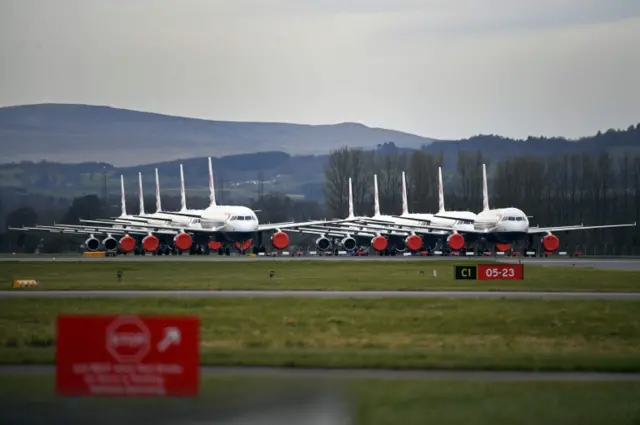 Image source, Getty Images
Image source, Getty ImagesTransport Secretary Michael Matheson has predicted air travel to and from Scotland will take at least five years to return to pre-coronavirus levels.
A limited number of flights have continued during lockdown and he said the Scottish Government expects "a slow recovery of some air services" over the summer.
This will start with domestic services and be followed by international routes, he said.
In a written answer to Scottish Conservative MSP Dean Lockhart about the speed routes can be re-established, Mr Matheson said: "Realistically, it will take at least five years for services to recover to pre-Covid-19 levels."
Allow X content?
This article contains content provided by X. We ask for your permission before anything is loaded, as they may be using cookies and other technologies. You may want to read X’s cookie policy, external and privacy policy, external before accepting. To view this content choose ‘accept and continue’.
Allow X content?
This article contains content provided by X. We ask for your permission before anything is loaded, as they may be using cookies and other technologies. You may want to read X’s cookie policy, external and privacy policy, external before accepting. To view this content choose ‘accept and continue’.
Allow X content?
This article contains content provided by X. We ask for your permission before anything is loaded, as they may be using cookies and other technologies. You may want to read X’s cookie policy, external and privacy policy, external before accepting. To view this content choose ‘accept and continue’.
Allow X content?
This article contains content provided by X. We ask for your permission before anything is loaded, as they may be using cookies and other technologies. You may want to read X’s cookie policy, external and privacy policy, external before accepting. To view this content choose ‘accept and continue’.
Allow X content?
This article contains content provided by X. We ask for your permission before anything is loaded, as they may be using cookies and other technologies. You may want to read X’s cookie policy, external and privacy policy, external before accepting. To view this content choose ‘accept and continue’.
 Drivetime with Fiona Stalker
Drivetime with Fiona Stalker
BBC Radio Scotland
Around five weeks ago, Schools in Finland opened up for the last two weeks of term after a two-month shutdown, with no significant rise in coronavirus cases.
"Children were kept in one learning group as much as possible, so that teachers were changing classrooms rather than the pupils," explains David McDougall, a Helsinki-based journalist.
"Desks were more spaced out and some classes moved outside, while bigger areas like gym halls were co-opted for more structured learning."
The Finns also introduced regular hand washing and sanitiser stations, had staggered times for breaks and lunch - and served those school lunches in classrooms to limit interaction.
It is thought up to 10% of pupils stayed away, but Mr McDougall says the general attitude in the country has been to trust in government advice.
He says the decision to return for just two weeks was driven by a constitutional guarantee of educational equality, which had been jeopardised by the earlier shutdown.
 Image source, SNS
Image source, SNSA crowd of 47,494 watched Rangers lose the first leg at Ibrox on 12 March, the day before all football in the UK was suspended
Rangers will play the second leg of their Europa League last-16 tie against Bayer Leverkusen on the 5 or 6 August with a venue still to be confirmed.
The match will take place either at the BayArena as originally planned, or elsewhere in Germany.
Should Rangers overturn the 3-1 first-leg deficit, they would play in a 'final eight' tournament to be held in Germany from 10-21 August.
Meanwhile, Glasgow City's Women's Champions League quarter-final tie with Wolfsburg will be played under the same tournament format in northern Spain from 21 August.
 Drivetime with Fiona Stalker
Drivetime with Fiona Stalker
BBC Radio Scotland
"A masterclass in passing the buck," is how Jo Bissett, the co-organiser of the Us for Them Scotland group, describes the answers given by Education Secretary John Swinney.
"Where is the evidence that opening schools normally would lead to an increase in transmissions and mortality rates?" she asks.
Ms Bissett also queries the criteria to be used when the blended learning approach can stop if it is brought in.
"If we are to plough ahead with this terrible plan, what are the criteria for exiting?
Parents have done their best with remote learning but many are coming forward "so many heart-breaking stories" she adds.
Ms Bissett says: "The number of deaths is decreasing. Seasonal flu rates would be typically five times what we are experiencing. We are not in a pandemic at this moment and we need to change our mindset and our policies in accordance with the data."
Allow X content?
This article contains content provided by X. We ask for your permission before anything is loaded, as they may be using cookies and other technologies. You may want to read X’s cookie policy, external and privacy policy, external before accepting. To view this content choose ‘accept and continue’.
 Drivetime with Fiona Stalker
Drivetime with Fiona Stalker
BBC Radio Scotland
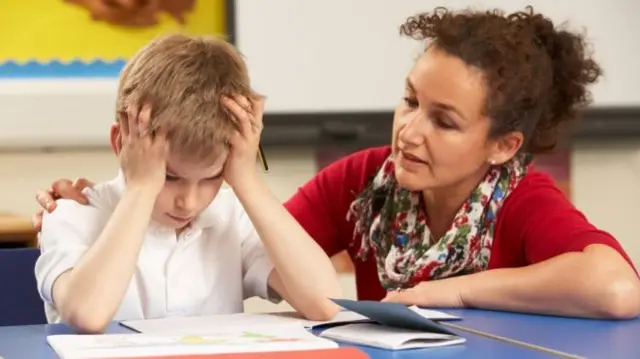 Image source, Thinkstock
Image source, ThinkstockAmie Harvey asks why the education secretary "refuses to acknowledge" problems with additional support needs schooling.
"My son has had everything taken away. He's not learned a single thing since lockdown because as with many additional needs kids, school and home are totally different places," she says.
She says the efforts of her sons school over the past two years to support him have been lost.
Mr Swinney agrees ASN children need tailored support and there is a need to restore these packages and approaches as early as possible.
Allow X content?
This article contains content provided by X. We ask for your permission before anything is loaded, as they may be using cookies and other technologies. You may want to read X’s cookie policy, external and privacy policy, external before accepting. To view this content choose ‘accept and continue’.
 Drivetime with Fiona Stalker
Drivetime with Fiona Stalker
BBC Radio Scotland
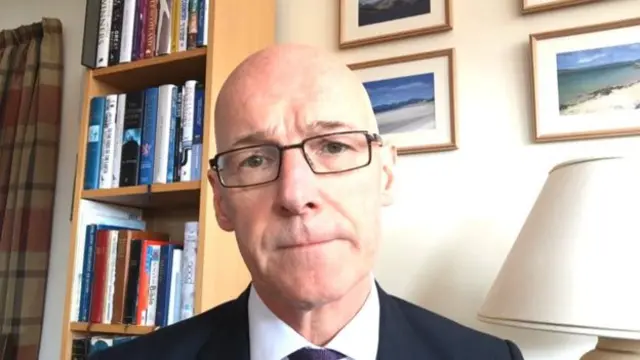
Education Secretary John Swinney
Education Secretary John Swinney insists councils have been told to maximise the time pupils will spend in schools.
Options schools can look at include maximising school accommodation, using buildings not on the school estate such as leisure centres and public halls, and making use of extra staff like probationer teachers, Mr Swinney tells Drivetime.
He says the government does not want to set a standard because schools and councils must design an approach that works for them. He says some schools have lower occupancy levels and they may be able to have nearly all pupils back full time immediately.
Councils are currently developing plans which will be scrutinised by the government to ensure opportunities for formal schooling are maximised and conversations on extra cash will also be had at this stage, says the education secretary.
He says the aspiration is to have all pupils receive a minimum 50% of time in school.
 Drivetime with Fiona Stalker
Drivetime with Fiona Stalker
BBC Radio Scotland
Prof Sridhar tells Drivetime it might be "painful" to see other parts of the country opening up - but it would also aid those who are shielding in those areas where there are no new cases, allowing them to go out safely.
She says the Scottish public have been "incredibly compliant" so far but warns that borders are a problem, using island nations like New Zealand, Australia Iceland and the Faroes as the best lockdown examples, adding that any increasingly divergent strategy with England remains a "large unknown" right now.
The academic is happy to see the continued decline in Covid-19 in Scotland but says a system of robust testing is essential to pick up local cases quickly. "Like putting out a small fire," she says.
 Drivetime with Fiona Stalker
Drivetime with Fiona Stalker
BBC Radio Scotland
"It's a win-win if we get our numbers down," says Devi Sridhar, chair of global public health at the University of Edinburgh, on the possibility of schools reopening somewhere close to normal fashion come August.
However, there could be regional differences across the country.
Professor Sridhar, who is part of the Scottish government's Covid-19 advisory team, told BBC Scotland the harder we hit the virus now, the easier it will be to open up.
She says nations like Norway, Denmark and Germany are doing a good job of learning to live with Covid-19 but that is being done with distancing in schools, along with an emphasis on hand hygiene and testing.
"I would like to see more local level data - and that being provided to the public," says Professor Sridhar, who adds that if certain parts of Scotland have no cases then it would be okay for schools to go back as normal, as long as precautions are taken.
Allow X content?
This article contains content provided by X. We ask for your permission before anything is loaded, as they may be using cookies and other technologies. You may want to read X’s cookie policy, external and privacy policy, external before accepting. To view this content choose ‘accept and continue’.
An otter gave an unexpected demonstration of its fish-eating abilities at Aberdeen Harbour on Wednesday morning.
The otter was spotted at the quayside by Ricky Greenhowe of Aberdeen Harbour Tours and he was quick to film the experience.
“It has become quite a regular visitor”, he said. “It’s been getting braver in the last couple of weeks.
“It had caught the fish itself. We were close - within about 3ft – and it was not caring. It certainly lifts the doom and gloom.”
 Drivetime with Fiona Stalker
Drivetime with Fiona Stalker
BBC Radio Scotland
The leader of Aberdeenshire Council has warned about the huge costs related to getting children back into school.
Cllr Jim Gifford predicts the extra costs will total £5-10m, which the local authority does not have he says.
He tells Drivetime the council is already likely to spend £30m more than it has a budget for before the extra education costs.
He says if the government want councils to create more space for teaching, they will need to provide extra resource.
Transport will also be an extra expense.
Cllr Gifford says this figure is not currently known, but with social distancing measures in place one coach will only be able to carry 8-12 pupils. Some schools in the rural region usually have 80% of pupils commuting by bus.
Allow X content?
This article contains content provided by X. We ask for your permission before anything is loaded, as they may be using cookies and other technologies. You may want to read X’s cookie policy, external and privacy policy, external before accepting. To view this content choose ‘accept and continue’.
The daily press briefing in Downing Street is under way in a few minutes.
Culture Secretary Oliver Dowden is leading the briefing.
 Drivetime with Fiona Stalker
Drivetime with Fiona Stalker
BBC Radio Scotland
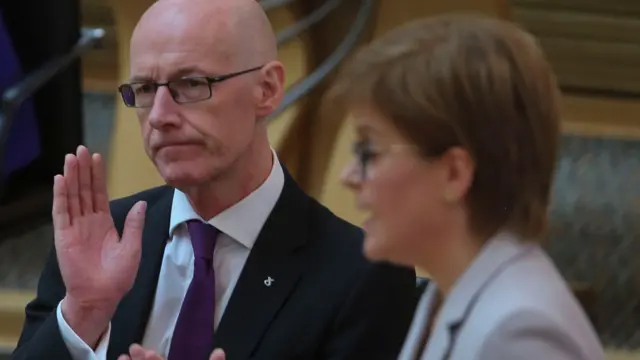 Image source, PA Media
Image source, PA MediaJohn Swinney applauds the first minister in parliament earlier today
Education Secretary John Swinney will be answering questions from BBC Radio Scotland listeners from 17:05 BST.
Earlier today, the first minister was accused of "dithering" over plans to reopen the country's schools.
On Sunday, Mr Swinney told BBC Scotland it was "unlikely" that schools could return to normal before the end of the coming school year due to social distancing measures.
However, Nicola Sturgeon said this afternoon that her government would "move heaven and earth" to get schools "back to normal as quickly as possible".
 Drivetime with Fiona Stalker
Drivetime with Fiona Stalker
BBC Radio Scotland
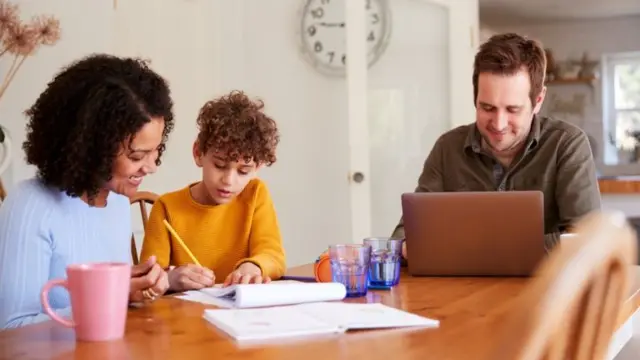 Image source, Getty Images
Image source, Getty ImagesJenny Stanning lives in Aberdeen and has three young children. She says the prospect of having to continue to home school for another year is worrying.
She is expecting details from her local school about how pupils will return next Wednesday - but she expresses concern Aberdeen City Council has suggested there will be a maximum 30% capacity.
Jenny says her family has been "just about managing" over the last few weeks - but it not sure how she will cope for longer.
"The idea that this could continue for a whole year, a whole 12 months, of juggling three children, after-school care, nursery care, and home schooling really, really shook me."
Campaigners are calling for a 50% national minimum to be put in place. Jenny believes this would be a "really good starting point".